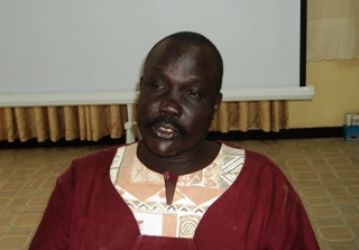South Sudan newspaper editor calls for sanctions against top officials
July 9, 2013 (JUBA) – The editor in chief of one of South Sudan’s leading independent newspapers blasted the international community on Tuesday, accusing them of sympathising with the governing Sudan’s People’s Liberation Movement (SPLM), due to their interest in the country’s oil.

“I yesterday asked one of the ministers what their plans are with the new oil revenues and he said no plan. They are thinking about new cars and new wives. The future is gloom[y].”
The senior journalist, who has been detained by South Sudan’s security services on various occasions for his paper’s criticism of the government, said that top members of the SPLM were planning “to use oil money to buy weapons so that they can kill themselves during [the] 2015 elections”.
Bol was speaking at a round table discussion the achievements, challenges and plans of the new nation hosted by Radio Miraya FM, which is sponsored by the United Nations Mission in South Sudan (UNMISS).
He said the international community was reluctant to pressure the government to embrace good governance and adopt transparency and accountability.
“The international partners are becoming members of SPLM. They are not neutral. They are supporting their friends.”
He recalled that a senior UNMISS “human rights worker was expelled and [the international community] kept quiet.”
Bol also said that diplomats were “not putting enough pressure on the government on [the] Jonglei situation” where a rebellion is fighting the government and the army has been accused of numerous serious human rights violations against civilians.
“The prisons are ever full and they do not care. They just pass by the prisons as if they are passing by zoo”, Bol added.
The soft stance towards the former rebel movement, which has governed South Sudan since a 2005 peace deal with Khartoum, is “because of the interest in oil” he alleged.
The international community “are not partners at all. They should show independence and put sanction[s] on the senior officials. They should not be allowed to travel.”
He wondered why the international community put sanctions on the governments like Zimbabwe, while leaving those with similar human rights records roam freely.
“They are keeping quiet here and make noise for Zimbabwe. We are actually the worse than the failed state. The security situation is more alarming. Our prisons are full”, he said.
The government’s development programmes suffer from a “lack of vision and direction”, he said.
Meanwhile, Yien Mathew Chol, a SPLM spokesperson, warned that the country might “slide into state of anarchy” because the party had been hijacked by opportunists. He said that the records of senior politicians were being examined by the party’s secretariat.
“I agree with Nhial Bol, the country might anytime slide into war. Some may die.”
Pointing to the murder of a prominent opinion writer six months ago, he said that “Anything can happen” adding that Isaiah Abraham was a “real member of the SPLM” as he tried to hold the movement to the principles it fought for during the civil war.
Abraham was killed, Chol said “because the party has been hijacked.
CORRUPT OFFICIALS NOT PROSECUTED
Chol said the SPLM secretariat had passed a resolution demanding the government release the names of senior officials whom president Kiir wrote to last year asking that they return over $4bn in stolen oil revenue.
“When the president issued the letters to 75 officials accused to have embezzled public funds, we congratulated him and told him clearly that we are ready to help him fight corruption”, he said. Now Chol fears that the leadership may not prosecute the real culprits as no officials have been named, let alone suspended or taken to court over the scandal.
Two senior ministers were suspended last month in another scandal regarding a large scale government acquisition. Both have vowed to prove their innocence.
“There is this culture that when I become a minister, the office manger and the private secretary comes from my tribe, from my community, from my region. This is killing. It does not allow proper check[s] and balances and I am afraid the leadership is [not] addressing it correctly. They are targeting opponents and leave real culprits. They are holding sticks in the middle. The anti-corruption [commission] and the police are never independent because they are appointed”, he explained.
Onyoti Adigo, the leader of the main opposition party in South Sudan’s legislative assembly, said the government had failed to deliver basic services. He said this was because top-level officials, especially ministers and senior military officers, have no experience of the reality of living, working and studying in South Sudan.
The senior member of the SPLM-Democratic Change, which split from the SPLM in 2009, said their daughters and sons of ministers and commanders are studying outside the country.
“They are in America. They are in UK. They are in Uganda. They are in Kenya. They do not feel anything [as] their immediate family members are abroad”, said Adigo.
(ST)
